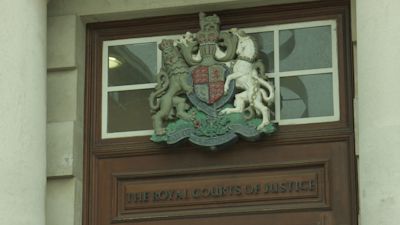Man caught in Continuity IRA surveillance operation loses High Court bid to secure prison release

A man caught in a surveillance operation targeting the Continuity IRA has lost a High Court battle aimed at securing release from prison under a Royal Prerogative of Mercy (RPM).
Terence Marks issued proceedings against Stormont Justice Minister, Naomi Long, for declining to consider his request to be freed through the discretionary government permit.
But a judge backed Mrs Long’s position that authority for issuing any RPM in the case lies instead with the Secretary of State, because Marks’ offences involved non-devolved matters of terrorism.
Dismissing the application for judicial review, Mr Justice Scoffield said: “These appear to me to be matters which were highly likely to have been intended to have been reserved to the UK authorities, rather than transferred to the devolved administration, for decision-making.”
Marks, 62, of Parkhead Crescent in Newry, is currently serving a four-year sentence for belonging to a proscribed organisation and receiving weapons training.
He was among seven men convicted in connection with an MI5 bugging operation at a house in the city back in 2014.
Covert recordings revealed that at one meeting explanations on how to make pipe bombs were provided to him, with the trial judge finding he was fully aware those present were members of a terrorist organisation.
In December last year the Court of Appeal ruled that new anti-terror legislation which retrospectively pushed back the release dates for Marks and his co-defendants breaches their human rights.
However, it was left up to Parliament to make any necessary amendments to the relevant provisions.
Under the new regime Marks must serve two-thirds of his sentence behind bars before Parole Commissioners can determine if he is eligible to get out of jail.
The law change means his expected release date moved from February to October this year. Depending on assessments, he may even remain in custody until February 2024.
Solicitors representing Marks sought the RPM from the Justice Minister, but she formed the view that she did not have the necessary power because it was a reserved, terrorist-related matter under the Northern Ireland Act 1998.
Marks’ request was passed on to the Secretary of State and ultimately refused.
In a challenge centered on who is the correct decision-maker, it was claimed that the offences amounted to “subversion”.
However, Mr Justice Scoffield held that Marks’ crimes and the surrounding circumstances fell within the definition of “terrorism”.
“I would venture that members of the public would be surprised to hear that convictions for membership of a terrorist organisation and the receipt of weapons training in that context were not considered to be terrorism for this purpose,” he pointed out.
The judge confirmed: “The respondent was correct in law to consider that the exercise of the RPM in this case did relate to offending which constituted “terrorism” within the meaning of that term in the schedules to the Northern Ireland Act.”
Want a quick and expert briefing on the biggest news stories? Listen to our latest podcasts to find out What You Need To Know.